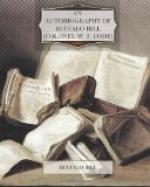After one of these sallies, Captain Sweetman, Lieutenant Bache, and myself were taking supper together when “Whang!” came a bullet into Mr. Bache’s plate. We finished our supper without having any more such close calls.
At daylight next morning we took the trail again, soon reaching the spot where the Indians had camped the night before. Here there had been a large village, consisting of five hundred lodges. Continuing our pursuit, we came in sight of the retreating village at two in the afternoon. At once the warriors turned back and gave us battle.
To delay us as much as possible they set fire to the prairie grass in front and on all sides of us. For the remainder of the afternoon we kept up a running fight. Repeatedly the Indians attempted to lead us away from the trail of their fleeing village. But their trail was easily followed by the tepee poles, camp-kettles, robes, and all the paraphernalia which proved too heavy to carry for long, and which were dropped in the flight. It was useless to try to follow them after nightfall, and at dark we went into camp.
Next morning we were again on the trail, which led north and back toward Beaver Creek. The trail crossed this stream a few miles from where we had first discovered the Indians. They had made almost a complete circle in the hope of misleading us.
Late in the afternoon we again saw them going over a hill far ahead. Toward evening the main body of warriors once more came back and fought us, but we continued to drive them till dusk, when we encamped for the night.
Soon the Indians, finding they could not hold out against us, scattered in every direction. We followed the main trail to the Republican River, where we made a cut-off and proceeded north toward the Platte.
Here we found that the Indians, traveling day and night, had got a long start. General Carr decided we had pushed them so hard and given them such a thorough scaring that they would leave the Republican country and go north across the railroad. It seemed, therefore, unnecessary to pursue them any further. Most of the Indians did cross the river near Ogallah as he predicted, and thence continued northward.
That night we returned to the Republican River and camped in a grove of cottonwoods, which I named Carr’s Grove in honor of our commander.
General Carr informed me that the next day’s march would be toward the headwaters of the Beaver. I said that the distance was about twenty-five miles, and he said we would make it the next day. Getting an early start in the morning, we struck out across the prairie. My position, as guide, was the advance guard. About two o’clock General Carr overtook me and asked me how far I supposed it was to water. I replied that I thought it was about eight miles, although we could see no sign of a stream ahead.
“Pepoon’s scouts say you are traveling in the wrong direction,” said the general. “They say, the way you are bearing, it will be fifteen miles before we strike any branches of the Beaver, and that when you do you will find no water, for they are dry at this season of the year in this locality.”




